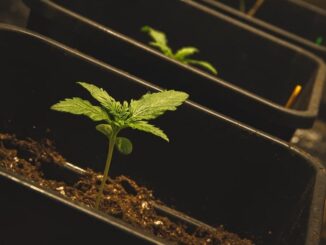
The cannabinoid family is large. It is estimated that it contains more than a hundred different molecules, the stars of which are obviously cannabidiol (CBD) and cannabidiol tetrahydrocannabinol (THC). The first is known for its calming effects. It’s also completely legal. On the contrary, its hostile brother THC is known for its powerful effects and its illegality in most European countries including France. As the market evolves, the general public is discovering the existence of new cannabinoids, with effects that are sometimes different, but always intriguing. What interests us today is the Tetrahydrocannabivarin, better known as THCV. Several questions arise: what is THCV ? What are its effects? Can it be used and if so, what for? We will answer them immediately.
Tetrahydrocannabivarin: everything we know about THCV

THCV is a naturally occurring cannabinoid found in hemp (Cannabis sativa).
THCV is a molecule relatively similar to that of THC. Like most other cannabinoids, it is present, at least in trace amounts, in most cannabis strains, legal or not. This is of little importance a priori, since At low doses, THCV is not a toxic molecule. However, at higher doses, its effects approach those of THC. We’ll get to that in a moment.
In the wild, not all cannabis strains are equal when it comes to the THCV levels they contain. That’s what we think highest levels of tetrahydrocannabivarin in cannabis sativaespecially among some tribes from Africa.
As always, since cannabis cultivation has existed (several millennia), breeders try to select the plants with the most interesting properties, without always knowing which cannabinoids are the source. This is the case of THCV, the rate of which has been encouraged more or less voluntarily by certain breeders during the hybridization of certain strains.
Also, without laboratory analysis of a cannabis plant and its effects, is it so easy to distinguish between THC and THCV?
THCV or THC: what are the differences?

Unlike THC, THCV has two fewer carbon atoms (right part of the molecule)
The THCV molecule is relatively close to that of THC. The main difference, scientifically speaking, is that THCV has a propyl (a three-carbon group) instead of a pentyl (a five-carbon group). This subtlety, seemingly minimal, is nevertheless implied quite clear differences in effect of the cannabinoid.
In both cases, high doses involve interaction of the cannabinoid with the organism and psychoactive effects. The similarity ends here.
In fact, THC and THCV are not, even though their names sound suspiciously similar not derived from the same parent compound. Thus, THC (like CBD, the CBC, and CBG) is derived from cannabigerolic acid (CBGA). THCV (and THCVA, its acid form) is derived from cannabigerovarian acid (CBGVA).
So much for the technical data, abstract to say the least. Let’s see what that means on a concrete level and therefore in terms of impact.
What are the effects of THCV?

THCV is sometimes referred to as a “diet cannabinoid” for its ability to suppress appetite.
THCV is primarily known for its ability reduce appetite. That earned him his nickname Diet Cannabis, or diet cannabinoid. This is an unexpected trait, as consuming cannabis in general has a reputation for making you hungry. This reputation is due to THC activating the CB1 sensors of our endocannabinoid system (DRY). However, CB1 is known to be involved in appetite stimulation. Unlike THC, THCV receptor antagonist CB1. By blocking them, it likely contributes to a decrease in appetite. This conclusion is supported by several studies, including one conducted in 2009 [Link auf Englisch], suggesting that THCV might encourage weight loss. However, these results are only available in animals.
Another study conducted in 2013 [Link auf Englisch]suggests that THCV can reduce glucose intolerance caused by obesity. The results this time show no direct link between THCV intake and reduced appetite. The energy expenditure of mice that had consumed tetrahydrocannabivarin this time increased significantly, Improving an individual’s glucose tolerance and insulin sensitivity. These results, which are still preliminary, nevertheless represent a reality Treatment hope for people with diabetes. However, there is still a long way to go before definitive conclusions can be drawn for humans and potentially a useful dosage for diabetics can be determined.
Can THCV get you high?
Yes indeed. at high doses, THCV can get you high, like THC, a cousin molecule. However, the two cannabinoids act very differently on the body: THC activates the CB1 sensors of the endocannabinoid system, while THCV tends to block them. Tetrahydrocannabivarin therefore seems block certain effects of THCespecially in terms of speech, the feeling of hunger and the acceleration of the heart rate.
Is THCV legal?
There is still no clear answer to this question. On the one hand, THCV is not not specifically mentioned in French and European laws. So, strictly speaking, it’s not forbidden. However, psychoactive molecules like THC are considered narcotics, and THCV is undeniably psychoactive (it can get you high). Marketing and consumption of THCV in Europe are therefore in the gray area. While we wait to learn more about this cannabinoid, it should be noted that according to the available scientific documentation, THCV does not appear to be accompanied by any major side effects.
